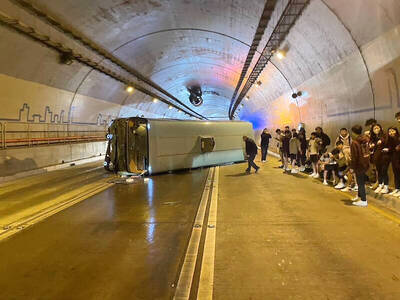About 600,000 lanterns are expected to illuminate Taiwan tomorrow as cities around the nation commence their Lantern Festival celebrations, but the Environmental Protection Administration (EPA) urged the public yesterday to celebrate the first of the nation's three major festivals in an environmentally friendly way.
"Considering that two batteries are generally needed per lantern, 1.2 million batteries will be used during the Lantern Festival this year," EPA recycling fund management board executive director, Lin Chien-hui (
Taiwan's battery recycling rate is over 30 percent, Lin said, higher than many European countries whose aim is to reach 25 percent by 2012. However, "this still means that 840,000 triple-A batteries will be exposed to the environment after the festivities," he said.
Batteries need to be recycled mainly because of the heavy metals they contain. Metals such as mercury, cadmium and lead are harmful to human health, Lin said.
Inside the body, mercury and lead attack the central nervous system, Lin said, adding that cases of hair loss or mental retardation in children have been attributed to lead.
In addition, cadmium blocks the absorption of calcium, an essential nutrient needed for bone health, he said, adding that too much cadmium in one's system can cause bones to curve.
The Lantern Festival, which falls on Jan. 15 of the lunar calendar, came about more than 2,000 years ago, although its origin is debated.
Some believe it evolved from Buddhism, and was added to the practice of worshipping gods on the first full-moon of the year, using lanterns to pay respect to divinity. Some believe this gradually evolved into a festival dedicated to making elaborate lanterns.
Others say that the tradition was started by Emperor Wun of the Han Dynasty, who took the throne on Jan. 15 of the lunar calendar after winning a series of chaotic civil wars. Some believe he started the custom of hanging lanterns to celebrate his day of victory.
Regardless of its origins, every city and county in Taiwan now puts on celebrations during Lantern Festival every year, Lin said, and festival-goers usually bring along their own lanterns to the party.
"Choose batteries that bear the recycling logo on the package and also look for the line `this battery complies with EPA regulations for mercury content [5ppm or below],'" Lin said.
In addition, take batteries out of the lanterns after use, or place them into other appliances to maximize the battery's usage, he said.
"At the end of the batteries' life cycle, bring them to recycling bins in convenience stores, supermarkets, or electronic stores in your neighborhood. Not only can this save the environment, but the heavy metals can be recollected and recycled for other uses," he said.

The Central Weather Administration (CWA) today issued a "tsunami watch" alert after a magnitude 8.7 earthquake struck off the Kamchatka Peninsula in northeastern Russia earlier in the morning. The quake struck off the east coast of the Kamchatka Peninsula at 7:25am (Taiwan time) at a depth of about 19km, the CWA said, citing figures from the Pacific Tsunami Warning Center. The CWA's Seismological Center said preliminary assessments indicate that a tsunami could reach Taiwan's coastal areas by 1:18pm today. The CWA urged residents along the coast to stay alert and take necessary precautions as waves as high as 1m could hit the southeastern

The National Museum of Taiwan Literature is next month to hold an exhibition in Osaka, Japan, showcasing the rich and unique history of Taiwanese folklore and literature. The exhibition, which is to run from Aug. 10 to Aug. 20 at the city’s Central Public Hall, is part of the “We Taiwan” at Expo 2025 series, highlighting Taiwan’s cultural ties with the international community, National Museum of Taiwan Literature director Chen Ying-fang (陳瑩芳) said. Folklore and literature, among Taiwan’s richest cultural heritages, naturally deserve a central place in the global dialogue, Chen said. Taiwan’s folklore would be immediately apparent at the entrance of the

“China is preparing to invade Taiwan,” Deputy Minister of Foreign Affairs Francois Wu (吳志中) said in an exclusive interview with British media channel Sky News for a special report titled, “Is Taiwan ready for a Chinese invasion?” the Ministry of Foreign Affairs said today in a statement. The 25-minute-long special report by Helen Ann-Smith released yesterday saw Sky News travel to Penghu, Taoyuan and Taipei to discuss the possibility of a Chinese invasion and how Taiwan is preparing for an attack. The film observed emergency response drills, interviewed baseball fans at the Taipei Dome on their views of US President

Speeding and badly maintained roads were the main causes of a school bus accident on a rainy day in Taipei last year that severely injured two people and left 22 with minor injuries, the Taiwan Transportation and Safety Board said. On March 11 last year, a Kang Chiao International School bus overturned inside the Wenshan Tunnel (文山隧道) on the northbound lane of the Xinyi Expressway. The tour bus, owned by Long Lai Co, exceeded the speed limit after entering the tunnel, the board’s investigation found. Sensing that the rear of the vehicle was swaying, the driver attempted to use the service and exhaust